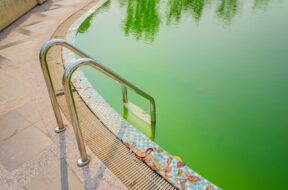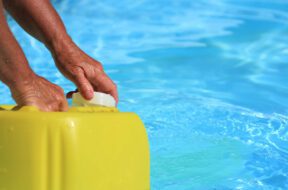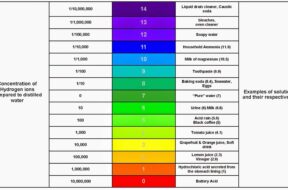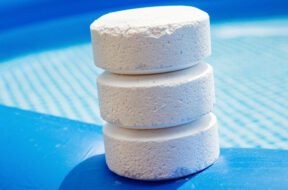
Want to learn more about algaecide? Read on to find out when to add algaecide to your pool maintenance routine and other helpful tips.
Labor Day is often considered the unofficial end to the Pool Season. Kids are back in school, and depending where you live, temperatures are dropping and many people are starting to think about closing their swimming pool.
amzn_assoc_tracking_id = “poolcalcula04-20”;
amzn_assoc_ad_mode = “manual”;
amzn_assoc_ad_type = “smart”;
amzn_assoc_marketplace = “amazon”;
amzn_assoc_region = “US”;
amzn_assoc_design = “enhanced_links”;
amzn_assoc_asins = “B002WKKEU2”;
amzn_assoc_placement = “adunit”;
amzn_assoc_linkid = “52995d77ee6a544ac00eca354dcf4ccc”;
There are many good reasons to go through a formal pool cleaning process every season. Winterizing your pool correctly protects it from damage, gets the water in good condition for the months it is shut down, and will make it much easier and less expensive to re-open the following summer.
Assuming you live in a climate where it is important to winterize your pool, here’s some guidelines to help you decide when to close your pool.
A water heater can extend your season significantly. Home pool heaters can typically extend a season about one month before and after the traditional Memorial Day to Labor Day season, meaning you can keep you pool in many climates through October.
An important rule of thumb is to close your pool before the temperatures fall below freezing at night. You can buy timers and thermostats for your pumps that have freeze protection, which allows you to keep the pool open longer, but you need to make sure that that other pumps and water lines may be exposed to the cold and freeze
If you have a robotic pool cleaner, you should follow the manufacturer’s guidance on the water temperature to “Remove from Pool”. Running the robot below this temperature can damage the robot.
On the one hand, you need to close the pool before the temperatures get below freezing. However, you also need to make sure the water has cooled off adequately before closing the pool. You have two problems if you close your pool when the water is too warm. First, the chemicals you put in the pool to winterize it may not last until spring if the water is too warm. The warmer the water the faster the winterizing chemicals are consumed.
Second, you have a higher chance of algae growth if you cover the pool when the water is too warm.
Most experts recommend waiting at least until temperature drops below 65 degrees Fahrenheit (18 degrees Celsius) to winterize your pool. However, if you can wait longer until your pool is below 50 degrees Fahrenheit (10 degrees Celsius), you will have a much lower risk of problems occurring. Algae growth isn’t completely stopped until 40 degrees Fahrenheit (4 degrees Celsius).
Finally, an additional factor to consider is whether you have lots of trees in your yard or in your neighborhood. The leaves that fall can add a lot of organic matter to your pool, and create a big maintenance hassle. They can also stain your pool if left in the pool over the winter.
If you typically keep your pool covered year-around, this is less of a problem. If you don’t, you may decide to close your pool a bit earlier than you might otherwise (but make sure the pool temperature is below 65 at a minimum!).
It’s important to winterize your pool properly. Doing so will make opening your pool in the Spring easier and much less expensive.

Want to learn more about algaecide? Read on to find out when to add algaecide to your pool maintenance routine and other helpful tips.

In this quick guide, we’ll answer the question “can you over shock a pool” and unveil the factors to consider when shocking a pool.

Maintaining both pH and total alkalinity in your swimming pool is important for keeping your pool properly sanitized and non-corrosive. Total alkalinity is to pH what cyanuric acid is to free chlorine. Total alkalinity stabilizes pH levels. The ideal pool pH level is 7.4 to 7.6. The ideal total alkalinity level is 80 to 120 ppm.

The Association of Pool and Spa Professionals recommends free chlorine levels for both swimming pools and hot tubs be kept between 2.0 and 4.0 ppm. However, the Center for Disease Control recommends free chlorine stay above 1 ppm in pools and 3 ppm in hot tubs.